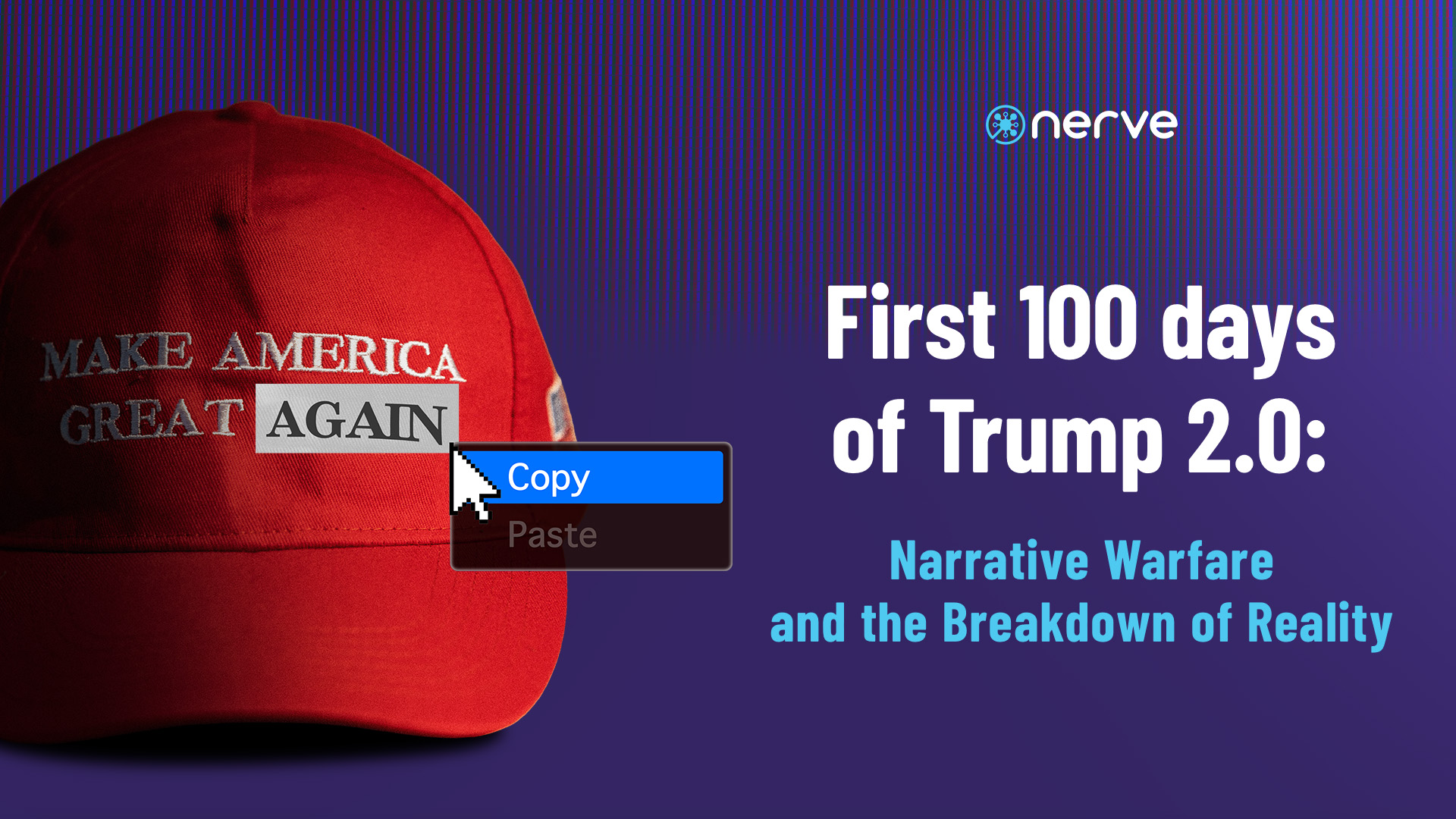[DECODED] SALN disclosures: Between skepticism and cynicism
Read more
How are people responding to politicians making their SALNs public?
MANILA, Philippines – A government official’s Statement of Assets, Liabilities, and Net worth, or SALN, can serve as a powerful tool: They can be a basis for spotting corruption or red flags with respect to government officials who need to be investigated.
As calls for the release of public officials’ SALNs mount amid the flood control corruption scandal, this begs asking: how do Filipinos look at such disclosures?
The Nerve looked at social media comments made on Rappler posts at various points regarding news on SALN disclosures.
Some welcomed them, while others threw in a healthy dose of skepticism or even downright cynicism.
SALN buzz after voluntary disclosures, ombudsman rules-easing
On September 1, Akbayan lawmakers Chel Diokno, Perci Cendaña, Dadah Kiram Ismula, and Dinagat Islands Representative Kaka Bag-ao released copies of their SALNs to the media. They hoped to convince other lawmakers to follow suit in the name of transparency and accountability.
Discussions on the SALNs of public officials were also brought up in part after Ombudsman Jesus Crispin Remulla lifted Duterte-era SALN restriction rules for officials under the Ombudsman’s purview.
The earlier actions of some lawmakers, coupled with further disclosures by Senators Risa Hontiveros and Kiko Pangilinan and Representative Leila de Lima, among others, have spurred additional disclosures by senators and representatives — even if they’re outside Remulla’s purview.
Heaping praise and attacks
For this September 1 post showing Akbayan lawmakers releasing their SALNs, one comment said that Filipinos were watching, and that only the corrupt would dare hide their SALNs.
“Tingnan natin ilan ang tapat sa bayan at walang tagong yaman,” the commenter said. (Let’s see how many truly love the country and have no hidden wealth).
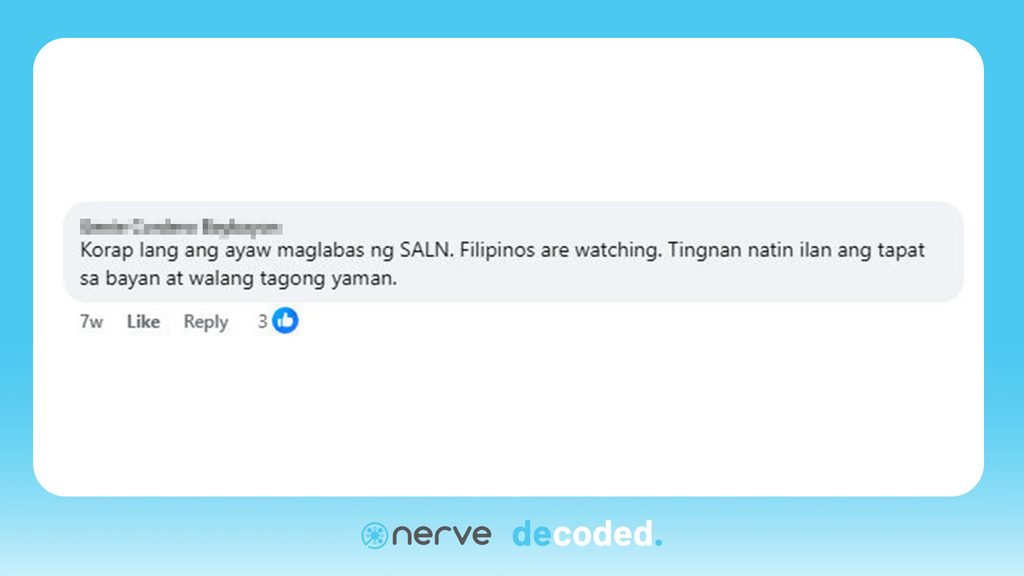
While SALNs are mandated to be filed, their disclosure is dependent on the laws set about by their custodians. One commenter noted how former ombudsman Samuel Martires restricted public access to SALNs that his office was in charge of.
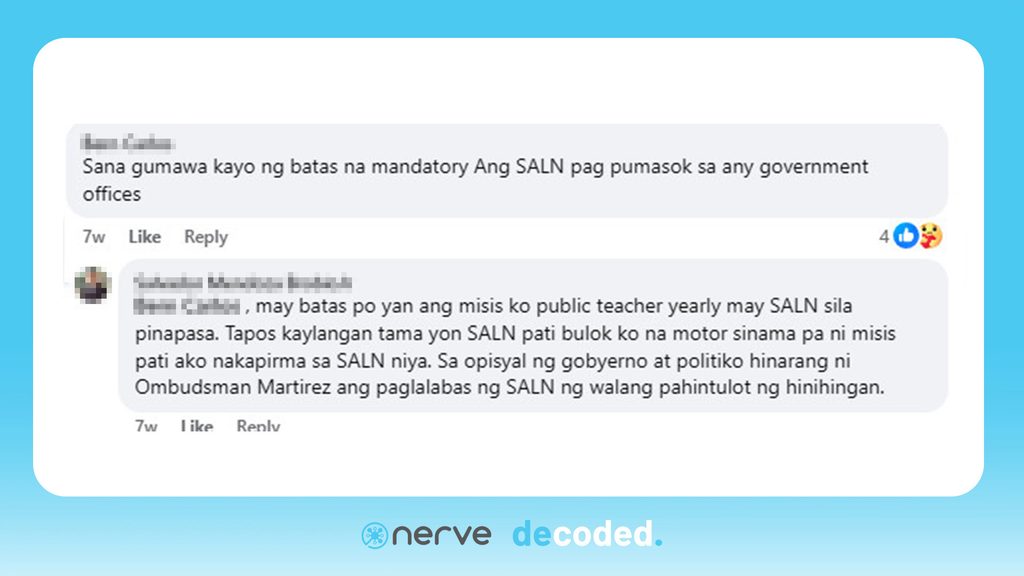
There were also two common types of commentary in the comments sections on Rappler Facebook posts on the SALN disclosures: either praise for those disclosing their SALNs publicly, or distrust in the process in general due to pre-formed opinions regarding a politician’s culpability for corruption.
In Rappler’s posts discussing Senator Risa Hontiveros’ public SALN disclosure, for example, there were comments heaping praise on her, but also attacks made against her for the already-debunked claim that she was behind a supposed insertion in the controversial 2025 budget.
One comment said she was “leading by example,” while another compared her disclosure favorably, as opposed to the non-disclosure of other politicians, namely the Dutertes.
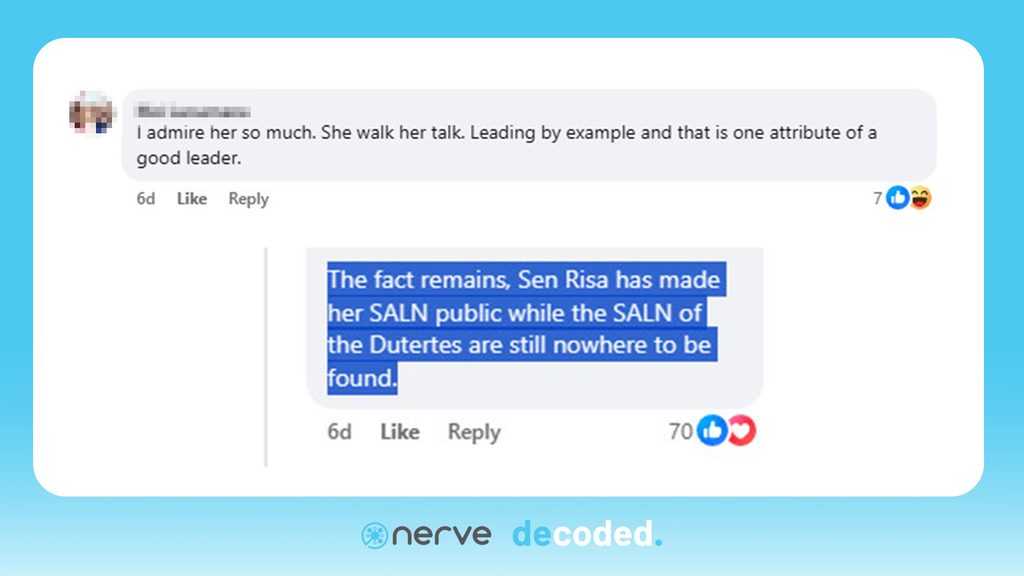
At the same time, others were referring to the budget insertions issue as a comeback to show Hontiveros was corrupt. These posts were called out for being wrong by other commenters, however.
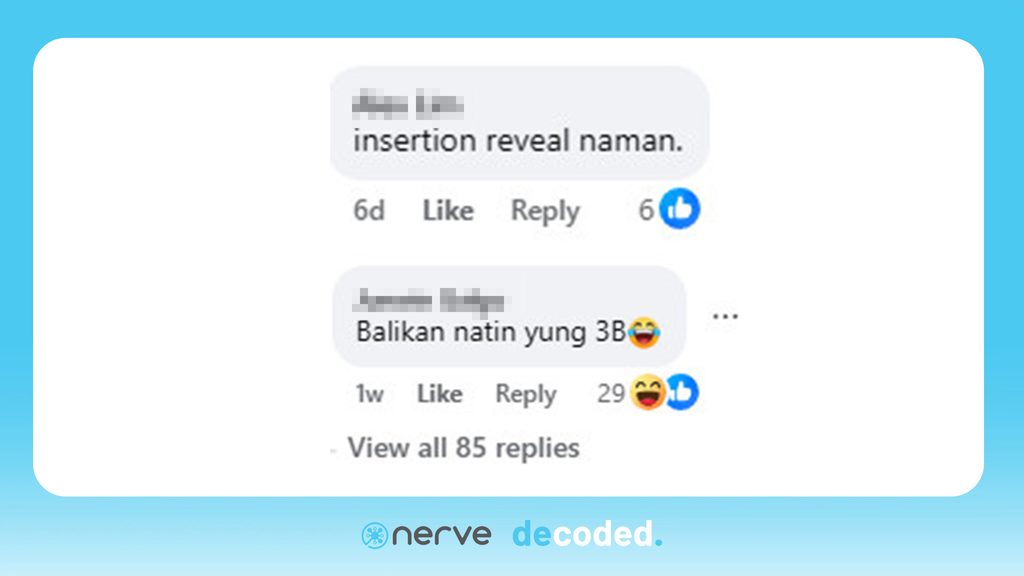
In the case of Rappler’s October 24 post on Mamamayang Liberal Representative Leila de Lima, meanwhile, gendered attacks persisted despite some positive sentiment regarding her SALN disclosure. While some said she led by example as well, others resurrected the attack against her in relation to her alleged romance with former aide Ronnie Dayan.
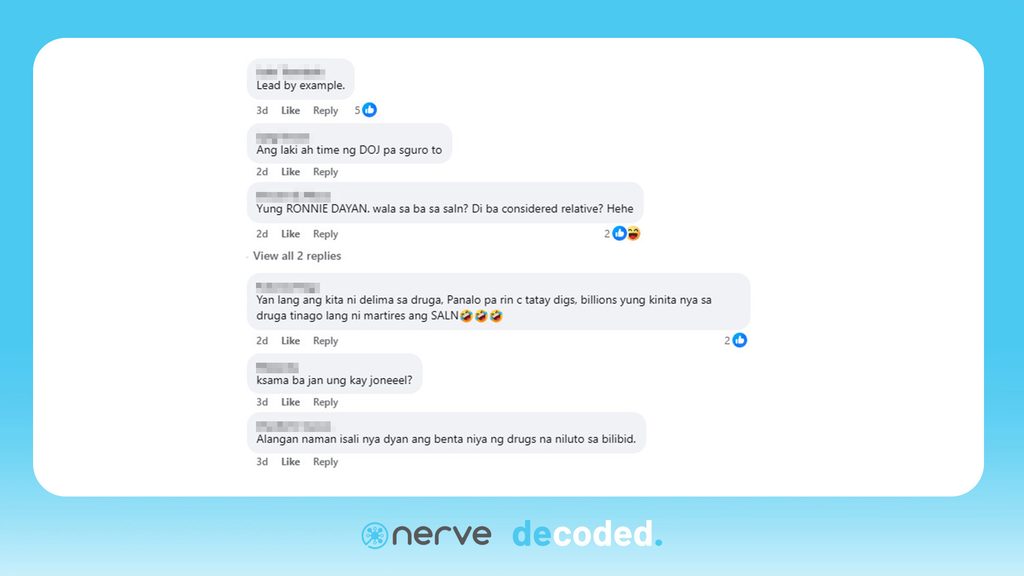
The highest post in the land
As of October 26, one other top official has not disclosed his SALN to the public: President Ferdinand Marcos Jr.
“[The President] is ready to hand over and show his SALN to the proper authority,” said Presidential Communications Undersecretary Claire Castro on October 26, while on the sidelines of the Association of Southeast Asian Nations (ASEAN) Summit in Malaysia.
The statement was made a day after Executive Secretary Lucas Bersamin disagreed with the “indiscriminate freedom to access these SALNs,” adding, “The purpose must be legitimate because we do not want the SALN to be a weapon because that will deter the service to the public sector.”
Commenters slammed the move, saying that placing restrictions on who could see the president’s SALN was effectively hiding it regardless, likening it to the Duterte family’s non-sharing of their SALNs.
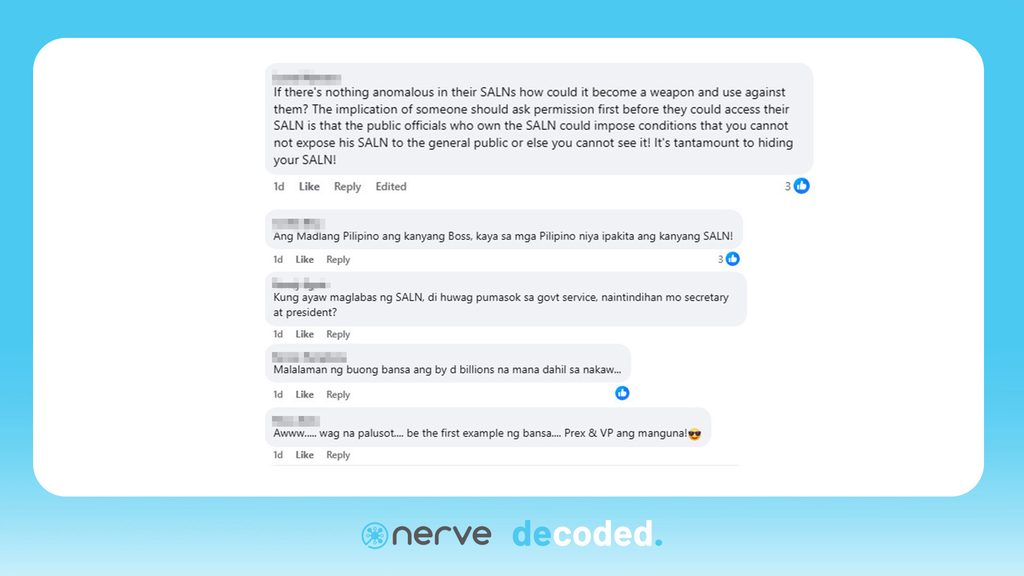
Bojie Dy’s politicking called a ‘family business’
In a Rappler social media post on October 22 regarding the SALN disclosure of House Speaker Bojie Dy, commenters cited his having 16 relatives in government as pain points, seeing potential conflicts of interest and corruption as possible outcomes of the “family business.”
Others were also dismissive of the SALN disclosures as not helpful in showing which officials were corrupt and deserved jail time.
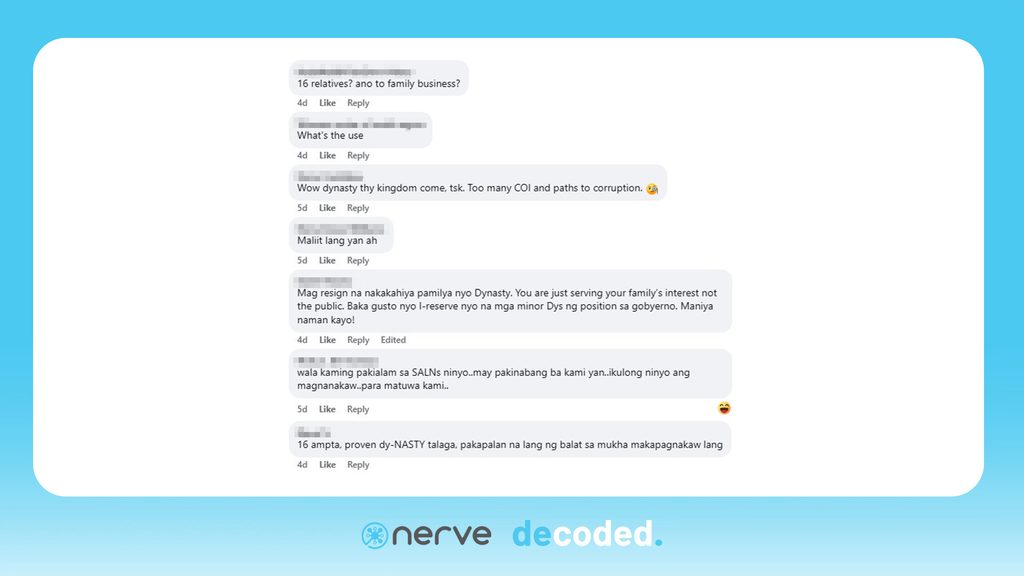
Why this matters
SALN disclosures should ideally be seen as trust-building, showing commitment to transparency and to living within the means provided them by Filipino taxpayers who fund their services.
In the end, perhaps one commenter on a Rappler post about whether more senators would disclose their SALNs put it best.
The commenter wrote that all government officials — from the president, vice president, senators, congressmen, all the way down to city engineers and even barangay-level politicians — get their paychecks from the tax-paying public and should publicize their SALNs.
“Karapatan ng mamamayan na malaman ang katotohanan. Simple lang naman yan; kung wala naman silang itinatago at pinoprotektahan, hindi sila matatakot ilabas at ipakita sa madla ang kanilang SALN.”
(It’s the right of the people to know the truth, and it’s simple: if politicians aren’t hiding anything or protecting something, they wouldn’t be afraid of showing their SALN to the public.) – Rappler.com
This story was originally published on Rappler on October 30, 2025.
Decoded is a Rappler series that tackles Big Tech not just as a system of abstract infrastructure or policy levers, but as something that directly shapes human experiences. It is produced by The Nerve, a data forensics company that enables changemakers to navigate real-world trends and issues through narrative and network investigations. Taking the best of human and machine, we enable partners to unlock powerful insights that shape informed decisions. Composed of a team of data scientists, strategists, award-winning storytellers, and designers, the company is on a mission to deliver data with real-world impact.




